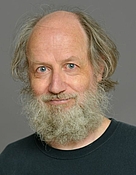Profiles of Leading Women Scientists on AcademiaNet.
Members
List of Members | Expert Search
Search among the members of the Leopoldina for experts in specific fields or research topics.

Photo: Markus Scholz for the Leopoldina
Lars Chittka
| Year of election: | 2021 |
| Section: | Organismic and Evolutionary Biology |
| City: | London |
| Country: | Great Britain |
CV Lars Chittka - German (PDF)
Research
Research Priorities: Entomology, evolutionary biology, cognitive research, sensory ecology, behavioural ecology
Lars Chittka is a biologist who conducts research into the evolutionary ecology of sensory systems and cognition by using insect-plant interactions as a model. He is especially renowned for his discoveries concerning the intelligence of honeybees and bumblebees. Chittka’s findings marked a departure from the prevailing view that insects were only capable of the most basic forms of associative learning. His work on the variation in cognitive skills between individual bees, colonies and bee populations has provided a new perspective on insect conservation.
With his working group, Chittka has made fundamental contributions to our understanding of how the cognitive-behavioural processes in animals function in ecosystems. His working group discovered that insects can create detailed memories of the landscape surrounding their hives, can count and can learn from each other in order to work out how to use tools. These findings sparked a new trend of exploring which cognitive skills could be implemented in an insect’s brain and how these skills could be realised on a neural level.
Using radar tracking, Chittka’s team has demonstrated how pollinating insects can solve a simple version of the travelling salesman problem, a statistical mathematical model of combinatorial optimisation. Chittka’s investigations on emotion-like states, social learning and speed-accuracy trade-offs in decision-making have enabled him to build neural models. These models show that sophisticated forms of information processing can develop from the same small neural circuit models that are used for “simple” classical conditioning. This has opened up the idea that many forms of cognition are “simple” on a computational level and can therefore evolve relatively easily.
In addition to neural principles, Chittka has conducted research into the variation in cognitive skills between individual bees, colonies and bee populations and has calculated the fitness benefits of learning ability in the wild. His discoveries have had far-reaching implications on our general understanding of animal cognition, its evolution and its neural bases and have offered a new perspective on nature conservation.
Career
- 2015 Guest Professor, Fujian Agriculture and Forestry University, Fuzhou City, China
- since 2005 Professor of Sensory and Behavioural Ecology, School of Biological and Behavioural Sciences, Queen Mary University of London (QMUL), London, UK
- 2003‐2005 Reader in Behavioural Ecology, QMUL, London, UK
- 2002‐2003 Senior Lecturer, QMUL, London, UK
- 2000‐2002 Senior Lecturer, University of Würzburg (JMU), Würzburg, Germany
- 1997‐2000 Lecturer, JMU, Würzburg, Germany
- 1994‐1997 Adjunct Assistant Professor, Stony Brook University, Stony Brook, USA
- 1994 Postdoctoral Fellow, Freie Universität Berlin, Berlin, Germany
- 1991‐1993 PhD, Freie Universität Berlin, Berlin, Germany
- 1984‐1991 Degree in Biology, University of Göttingen, Göttingen and Freie Universität Berlin, Berlin, Germany
Functions
- 2019 Chairperson, Board, National Scientific Program “Excellent Research and People for the Development of European Science” (VIHREN), Bulgarian Science Fund (BNSF)
- 2019 Member, Panel SyG3A, Synergy Grants, European Research Council (ERC)
- 2008‐2012 Founder and Scientific Director, Research Centre for Psychology, QMUL, London, UK
- 2011, 2013 Chairperson, Panel LS8, Consolidator Grants, ERC
- 2010 Vice Chairperson, Panel LS8, Starting Grants, ERC
- 2007‐2010 Member, Panel LS8, Starting Grants, ERC
Projects
- 2019‐2024 Member, Project “Foundations of Animal Sentience – ASENT”, ERC
- 2017‐2021 Member, Program Grant “Brains on Board: Neuromorphic Control of Flying Robots”, Engineering and Physical Sciences Research Council (EPSRC), Swindon, UK
- 2014‐2019 Coordination, Project “SpaceRadarPollinator: Space use by bees – radar tracking of spatial movement patterns of key pollinators”, ERC
- 2014‐2018 Member, Grant “A neural circuit approach to cognition and its limits in microbrains”, Human Frontier Science Program (HFSP)
- 2007‐2010 Coordination, Cognitive Systems Foresight Project “Bees and the travelling salesman problem: how tiny brains solve complex cognitive tasks”, Wellcome Trust, London, UK, Biotechnology and Biological Sciences Research Council (BBSRC), Swindon, UK and EPSRC, Swindon, UK
- 2006‐2009 Coordination, Project “Quantifying the dynamics of predator avoidance learning: bumblebees as a model”, Natural Environment Research Council (NERC), Swindon, UK
- 2004‐2007 Coordination, Project “The evolution of learning – bumblebees as a model”, NERC, Swindon, UK
Honours and Memberships
- since 2023 Fellow, American Association for the Advancement of Science (AAAS)
- since 2021 Member, German National Academy of Sciences Leopoldina, Germany
- 2017‐2018 Fellowship, Wissenschaftskolleg zu Berlin – Institute for Advanced Study, Berlin, Germany
- 2017 Media Star Award, QMUL, London, UK
- 2014 Wolfson Research Merit Award, Royal Society, UK
- since 2011 Member, Faculty Opinions (formerly: Faculty of 1000), London, UK
- since 2009 Member, Royal Society of Biology (FRSB), UK
- 2006 Lesley Goodman Award, Royal Entomological Society, St Albans, UK
- since 2004 Member, The Linnean Society of London (FLS), London, UK
- since 2004 Member, Royal Entomological Society (FRES), St Albans, UK

